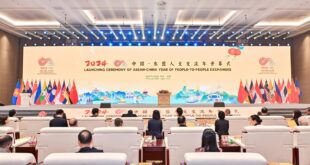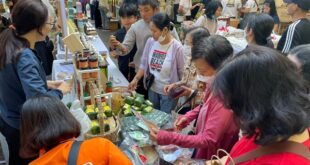After once seeing aloe vera plants being uprooted because demand evaporated, Nguyen Van Thu decided to quit his cushy banker’s job and work to add value to agricultural products.
In 2008-10, as a senior executive at a large bank in Ho Chi Minh City, he often went to the countryside to make credit appraisals.
Once in the central region he was told by locals about the attraction of aloe vera. But a short time later farmers had to uproot the plants and throw them away because processing companies stopped buying them.
He recalls: “Looking at the lush aloe vera plants being discarded, I felt sad. It struck me that I should make products from the plant to help people have a steady livelihood.”
As a finance man, he carefully spent two years collecting data and understanding the aloe vera market.
Speaking once to a Japanese businessman, Thu discovered that people in the the man’s country preferred aloe vera. In early 2011 Thu decided to set up his own business and named it G.C. Food Company.
 |
|
Nguyen Van Thu is called Mr Aloe Vera by his partners. Photo courtesy of Thu |
With VND2 billion (US$84,750) from savings and bank loans he built an aloe vera processing plant in Giang Dien Industrial Park in the southern province of Dong Nai and tied up with farmers in Phan Rang City in the central province of Ninh Thuan, where the climate is ideal for growing the plant.
In the first year itself his company got orders from large firms like Vinamilk, Nutifood and beverage makers.
Thu planned to take his aloe vera to the world after first taking it to Japan. In 2013, his company started exporting hundreds of tons of products to Japan.
“When the goods were shipped, I was very happy. But the happiness was short-lived. The partners said the aloe vera turned yellow, and the cancellation rate was some 3%.”
After accepting the goods back and a loss of more than half a billion dong, Thu examined the faulty products and discovered his company’s processing had many shortcomings.
He sought Japanese experts’ help to improve the processing and acquire basic technologies for aloe vera production to meet the stringent requirements of the Japanese market.
In the following consignments, some batches were returned due to the presence of ant nests outside the containers.
In 2014, Thu decided to build an aloe vera plant in Ninh Thuan with more stringent management processes that met Japanese standards.
He started by storing finished products for a week to make sure they did not develop foreign organisms.
He chose reputed suppliers and asked them to provide clean containers that had never been used for chemicals or other odor-causing items.
The entire container was inspected and disinfected before loading goods.
He went to farmers’ houses to place production orders and instructed them to grow aloe vera based on a new process that involved reducing the use of fertilizers and avoiding pesticides.
Instead of harvesting the aloe vera crop at one time, he started to prune it gradually so that it was available all year round.
Thanks to this, his company’s aloe vera is of high quality in terms of crispiness, sweetness and nutrition.
 |
|
Workers at G.C Food Company’s aloe vera processing plant in the central province of Ninh Thuan. Photo courtesy of G.C Food Company |
After five years of improving the production and growing processes, his company regularly exports its products to Japan and South Korea without any of it getting returned.
Export orders keep pouring in, and his foreign partners fondly call Thu “Mr Aloe Vera.”
His company’s production capacity is limited because of a shortage of machinery since aloe vera products are for a niche market and technologies and equipment are not meant for mass production. Some machines in the production line are not even available on demand.
Thu decided to recruit a team of engineers to research and develop technologies to meet his company’s needs such as machines for peeling and washing aloe vera and cutting seeds.
Proprietary technologies developed by its engineers currently account for half, and they meet most of the stringent requirements of importers.
Automation has gradually helped the company reduce the pressure to get seasonal workers. Many systems have an automation rate of 70%.
G.C Food’s aloe vera is shipped to 20 countries around the world at a rate of 12,000-15,000 tons a year, making it the biggest player in the Vietnamese market.
In Ninh Thuan, aloe vera generates an income of VND300-400 million per hectare per year.
Thanh Lai Chu, chairman of Son Phat Cooperative in Ninh Thuan, says 80% of the Cham people in the province used to be poor, but many have escaped poverty after Thu visited them and helped them grow aloe vera.
The cooperative has two hectares under the crop, which fetches annual revenues of VND1-1.4 billion. It and many other cooperatives plan to expand their aloe vera farming.
“All our products are bought by the company as contracted, and so we no longer worry about their prices,” Chu says.
The Ninh Thuan Department of Agriculture and Rural Development says the arrival of G.C Food in the sunny, windy land has revived aloe vera cultivation, helping hundreds of workers and farming households earn steady incomes.
During his recent visit Deputy Prime Minister Tran Luu Quang said G.C Food has a professional agricultural production model, and it is set to make a greater contribution to Ninh Thuan’s development.
“In agriculture, the sale problem is the biggest, but it has been resolved by the enterprise.”
According to a report by Grand View Research, a U.S. market research and consulting company, the global aloe vera market will grow by 7.6% a year in 2019-25 to reach $2.67 billion.
The growth will continue as aloe vera is increasingly used in many industries such as cosmetics and medicine, it has said.
In addition to aloe vera products, G.C Food also produces and exports coconut jelly. Its Japanese partners have sent experts to advise the company on production.
In 2016 G.C Food opened the Vinacoco factory in Dong Nai to make 12,000 tons of high-quality coconut jelly annually.
Last year its revenues increased by 27% to VND433 billion, and pre-tax profits stood at VND35 billion.
Late last year G.C. Food listed on the UpCOM stock market.
Its charter capital is VND162 billion with Thu holding 10.4 million of its 26 million shares.
He expects 20% growth this year despite the state of the global economy.
“I know farming will be a difficult long journey, but if you choose your own niche, the road will be less bumpy,” he says.
- Reduce Hair Loss with PURA D’OR Gold Label Shampoo
- Castor Oil Has Made a “Huge” Difference With Hair and Brow Growth
- Excessive hair loss in men: Signs of illness that cannot be subjective
- Dịch Vụ SEO Website ở Los Angeles, CA: đưa trang web doanh nghiệp bạn lên top Google
- Nails Salon Sierra Madre
 VnExpress News The News Gateway of Vietnam
VnExpress News The News Gateway of Vietnam




